Olga Benário Prestes (1908-1942)
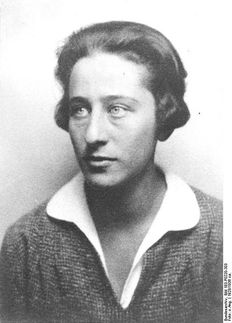
Olga was born in Munich, Gernmany, as Olga Gutmann Benário. In 1923, atthe age of fifteen, she joined the Communist Youth International. She attended the Lenin School of the Comintern in Moscow and worked as an instructor of the Communist Youth International in the USSR, France and the UK, where she took part in coordinating anti-fascist activities. She also attended the Zhukovsky Military Academy, and as a result of her military training, in 1934 she was assigned the task of helping Brazilian communist Luís Carlos Prestes return secretly to Brazil. She accompanied him as his bodyguard, under the cover of being his wife. By the time they arrived in Rio de Janeiro in November, 1935, they had fallen in love and married. They took part in a failed insurrection in 1935 and had to go into hiding. Barely escaping a police raid at Ipanema, they were both arrested in January, 1936 during an anti-communist crackdown by the Getulio Vargas regime.
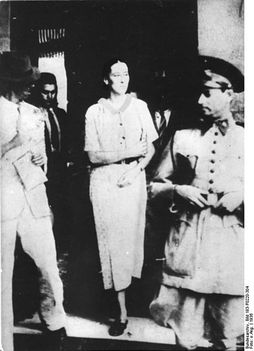
Under arrest in Brazil.
Pregnant and separated from Prestes, Benário stuck to her false identity, only to be exposed by Brazilian diplomats working with the Gestapo. Her lawyers tried to prevent her deportation on the grounds of her pregnancy, since her child would be a Brazilian national. Had they been able to delay the case until Benário gave birth it's unlikely she would have been extradited, but the case was rushed through, and in spite of an international campaign on her behalf, she was sent back to Germany in 1936. On arrival, she was put in prison, at Barnimstrasse Concentration Camp in Berlin, where she gave birth to a daughter, Anita Leocádia Prestes. As soon as Olga stopped breastfeeding the child, she was taken from her, to be placed in a Nazi orphanage, but was rescued by her paternal grandmother who took her to safety in Paris. Olga Benário was sent to Lichtenberg Prison, transferred to Ravensbruck concentration camp, and then to Bernburg Euthanasia Centre, where she was murdered in 1942.
Anita Leocádia Prestes (1936- )
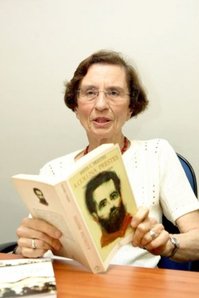
Anita Leocádia Prestes was born in Barnimstrasse concentration Camp in Berlin in 1936, and raised by her paternal grandmother, Leocádia Prestes. In 1964 she completed a degree in Chemistry at the University of Brazil. In 1970 she went into exile in the USSR. In 1972 the Brazilian authorities indicted her for her political activities and sentenced her to prison in her absence. In 1975 she received her Doctorate in Political Economics from the Institute of Social Science in Moscow. In 1979 her sentence was reduced by a Brazilian court as part of a wider amnesty, and she returned to Brazil. In 1989 she received a second Doctorate in History from the Fluminense Federal University. Her thesis, A Coluna Prestes, was a history of the movement her father led, a force of nearly 1500, working to overthrow the presidency of Artur Bernardes. She teaches graduate students in History at the Universidade Federal do Rio de Janeiro.
Yara Yavelberg (1943-1971)

Yara Yavelberg was a psychologist and professor, and became a member of the MR-8 guerrilla movement against the military dictatorship. She had a relationship with Carlos Lamarca, a Brazilian Army officer who deserted and became one of the most important leaders of the guerrilla movement that opposed the dictatorship. With the collapse of the guerrilla movement, Yavelberg and Lamarca fled to Bahia. She was thought to have committed suicide in Salvador, Bahia in 1971 but a recent autopsy shows that she was murdered by security agents. She was a friend of current Brazilian president Dilma Rousseff.
The University of Sao Paulo's Psychology Institute paid a homage to Yara, an alumnus of their Psychology School, by naming its academic center the Yara Yavelberg Academic Center.
The University of Sao Paulo's Psychology Institute paid a homage to Yara, an alumnus of their Psychology School, by naming its academic center the Yara Yavelberg Academic Center.
Clara Ant (1948- )
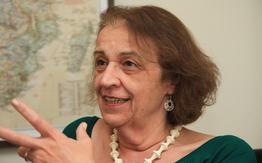
Leôncio Basbaum (1907-1969)
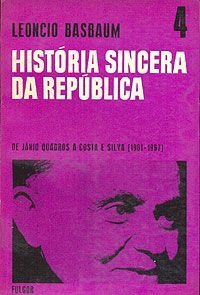
Leôncio Basbaum was a Marxist historian. The son of Ukrainian Jewish immigrants, he was born and raised in the state of Pernambuco. In 1929 he qualified as a medical doctor in Rio de Janeiro and joined the Communist Party. His four volume História Sincera da República is a widely respected Marxist history of Brazil, for which he is considered one of the country's most important historians.
Gilberto Dimenstein (1956- )
